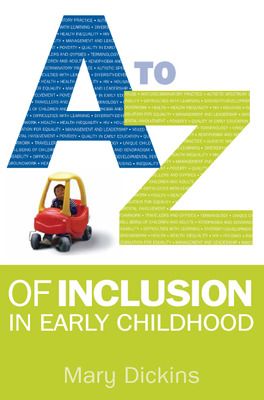A-Z of Inclusion in Early Childhood
- Access the eBook anytime, anywhere: online or offline
- Create notes, flashcards and make annotations while you study
- Full searchable content: quickly find the answers you are looking for
B: Behaviour, Bilingualism, Belonging
C: Communication, Culture
D: Disability, Difficulties with Learning, Diversity, Developmental Perspectives
E: Early Intervention, Entitlement
F: Families, Food
G: Gender Equality, Groundwork
H: Health, Health Inequality, HIV, Housing
I: Inequality, Intelligence
J: Joining in
K: Key Person, Knowledge
L: Listening to Children, Legislation for Equality
M: Management and Leadership, Mixed Heritage
N: Negotiation and Conflict Resolution, Networking
O: Observation, Outreach
P: Parental Involvement, Parenting and Disability, Poverty
Q: Quality in Early Education, Questions that Children Ask
R: Racism, Refugees and Asylum Seekers
S: Sensory Impairment, Safely and Risk, Sexuality, Social Class
T: Teamwork, Travellers and Gypsies, Terminology
U: United Nations Convention on the Rights of the Child, Unique Child, Underachievement
V: Voices of Practitioners
W: Well-being
X: Xenophobia and Xenoracism
Y: Young Children and Identity
Z: Zone of Proximal Development, Zenith
- It is based on a broad understanding of inclusion that embraces all forms of difference including race, gender, ability and class
- It draws on good practice developed over the years and describes challenges for the future
- It takes into account contemporary issues such as austerity measures, cuts to public services and a changing political landscape
- It brings the reader up to date with current theory, analysis, controversies and debates
"Mary Dickins has given us a book which is a beautifully written guide to the principles and practice of inclusion in young children's care and education. For some this will be an introduction to, for others a reminder of, knowledge and skills which we have developed over many years but which are too often misunderstood or ignored. Through her alphabetical approach it is possible to address a huge number of issues in a very accessible way, either dipping into it as needed or reading from beginning to end as a story of how we can improve the experiences of young children in childcare, and every entry comes with a list of references to enable readers to take the subject further. Informing the whole book is her knowledge and experience of this issue and her passion to support the development of a shared vision and understanding of it. As she says: 'inclusion is not a fixed state…we all have responsibility and a role to play in challenging discrimination and oppression'."
Sue Owen, Independent early years consultant
"I have learnt a lot from reading this book - and there is a lot to learn! Its scope is so enormous that inevitably it cannot cover everything, for example my pet topic of 'the power of assumptions'! It identifies the complexities of the various aspects of inclusion and touches on the inter-relatedness of many - for example, race and class. As readers dip into it I hope it will trigger further reading on particular issues and also stimulate more discussion of how institutional procedures and practices, deeply embedded in our society (the 'system'), remain barriers to inclusion. We all need to identify, understand and break down such barriers so that every one of our precious children, wherever they are, feel they truly belong."
Jane Lane, Advocate worker for racial equality in the early years
"Mary Dickins has long experience in early years and equality issues and writes from a defined value system. She encourages a proactive and anti-discriminatory approach which contributes to the development of - in her words - 'a shared vision, understanding and sense of purpose'. Mary stresses the importance of individual responsibility and transfer of specialist skills to a mainstream context. This book is a good addition to the continuing debate on inclusion from a clear children's rights perspective and a valuable resource for the early years sector, providing a framework to embed effective inclusive practice."
Julie Jennings, Royal National Institute of Blind People, UK

